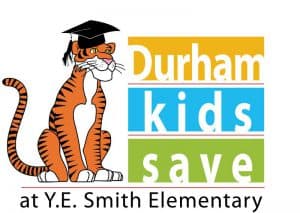By Mattie Sue Stevens, Management Analyst, City of Durham
 The City of Durham and its partners recently launched a children’s savings account (CSA) program, Durham Kids Save, to help children in a low-wealth neighborhood build savings for their college and career goals. The scale of Durham’s program is modest (for now), but it’s helping the City lay a foundation for bigger goals down the road.
The City of Durham and its partners recently launched a children’s savings account (CSA) program, Durham Kids Save, to help children in a low-wealth neighborhood build savings for their college and career goals. The scale of Durham’s program is modest (for now), but it’s helping the City lay a foundation for bigger goals down the road.
The Context: Mayor’s Poverty Reduction Initiative
During his State of the City address in February 2014, Durham Mayor William V. “Bill” Bell declared poverty reduction a key long-term priority for the city. Rather than instituting a new raft of citywide anti-poverty programming, the Mayor saw value in taking a more targeted approach, focusing on one area of the city at a time. Mayor Bell believed this “neighborhood by neighborhood, year by year” model would allow the community to try creative new programs at a manageable scale.
Following his State of the City address, Mayor Bell called together a diverse group of community leaders to launch a Poverty Reduction Initiative (PRI) in Durham’s Census Tract 10.01. These stakeholders eventually grouped into six task forces. Each task force is headed by local elected officials and charged with addressing a specific challenge facing this neighborhood.
The PRI Finance Task Force focuses on empowering families in this neighborhood to become more financially resilient and achieve their long-term financial goals. As the City and its partners work to develop a multi-pronged, systematic approach to financial empowerment across the community, the Finance Task Force’s work has become a testing ground for programs that may eventually expand citywide.
The Project: Durham Kids Save
One of the Finance Task Force’s key projects, Durham Kids Save, is a perfect example of this “think big, start small” approach. While a number of cities have launched citywide CSAs, enrolling thousands of students at a time, Durham Kids Save started with kindergartners at one elementary school in the PRI neighborhood. Eventually, Durham hopes to expand the program to other schools, but for now the Finance Task Force is staying focused on demonstrating success at this small scale.
And that success has been forthcoming. All 77 of the school’s kindergartners were automatically enrolled in the program in January 2016 with $100 seed deposits in each account. Over the spring semester, 65 families (84 percent) made deposits that totaled just over $1,000. These deposits were matched dollar-for-dollar by Durham Kids Save and will be held, bearing interest, until the students are ready for post-secondary education or vocational training. Durham Kids Save will continue to expand by one class each year until every student in kindergarten through fifth grade at the school is eligible.
The Ultimate Goal: A Strong Financial Empowerment System
Durham Kids Save supports Durham’s overall financial inclusion goals by helping families:
- Develop habits of saving toward long-term, aspirational goals.
- Feel more comfortable with banking and establish a trusting relationship with a financial institution.
- Engage their children in building wealth for the next generation.
The Finance Task Force is thrilled to see so many families engaged in saving for their children’s futures. Beyond these 77 families, however, the task force is also laying the foundation for a broader financial empowerment system in Durham.
For example, the City has forged strong partnerships to help get Durham Kids Save off the ground. Day-to-day operation of Durham Kids Save is provided by the East Durham Children’s Initiative (EDCI), a place-based nonprofit that provides a pipeline of support services for children in East Durham. EDCI is pursuing big goals of its own around college preparation and access, so the CSA program is a natural fit. Other partners like Durham Public Schools, the Corporation for Enterprise Development, and Self-Help Credit Union are also on board because Durham Kids Save aligns with their big-picture aims.
The CSA program also has clear connections to other components of the City’s developing financial inclusion strategy for this neighborhood—including Volunteer Income Tax Assistance (VITA) site participation, financial education and counseling, and promoting access to banking services. In fact, many of these programs are currently being facilitated by the same nonprofit partners as Durham Kids Save.
Durham hopes to capitalize on these connections to help families achieve their financial goals. This year, the City will be exploring strategies to cross-promote the CSA, VITA and financial coaching programs through creative incentives and information sharing. If successful, this cooperation will also help strengthen relationships among the involved agencies. As Durham continues to build out its financial empowerment system, the City hopes that this history of shared small-scale victories will set the stage for bigger collaborative efforts that benefit the whole community and provide children with the opportunity to reach their full potential.
